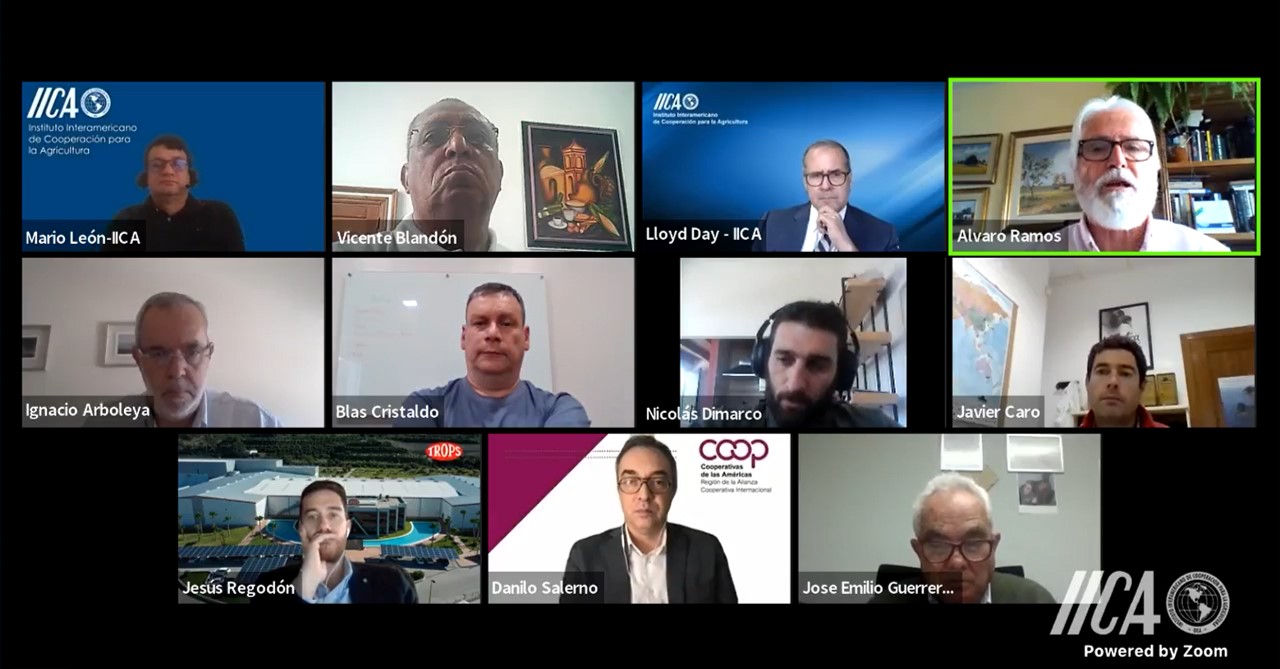The Inter-American Institute for Cooperation on Agriculture (IICA) organized a forum to share success stories of information and communication technology use in small- and medium-sized farmer cooperatives from Spain, Argentina, Paraguay and Honduras.

San Jose, 15 December 2021 (IICA). Cooperatives offer an ideal opportunity for small and medium-sized farmers in the Americas to incorporate digital technologies into their activities more quickly with the aim of improving productivity, market access, competitiveness and income.
These were the conclusions of a virtual forum organized by the Inter-American Institute for Cooperation on Agriculture (IICA) to share the success stories of Spanish cooperatives Oleoestepa and TROPS, the Argentine Federation of Technology, Innovation and Knowledge Worker Cooperatives (FACTTIC), Apagüiz Limitada of Honduras and Paraguay’s Production Cooperative Federation (FECOPROD).
Oleoestepa, a leading extra virgin olive oil production and marketing cooperative with over 60,000 hectares of olive groves and 7,000 member farmers, uses digital technologies for traceability, production control, internal communication and marketing, says Javier Caro, Research, Development and Innovation Manager.
Caro explained that the production plant is outfitted with a data monitoring, control and acquisition system to monitor and control production at all times. They also offer online shopping, which has generated an annual sales growth of 30%.
“We are currently assessing technologies related to precision agriculture, such as weather stations and remote sensing by satellite or field sensors to acquire and process data using AI and Big Data, with the end goal to increase olive production with less input and more sustainability”, added Caro.
TROPS, a leading producer and trader of avocado and mango with over 3,000 farmers, also uses digital technologies in a variety of ways, affirmed Jesús Regodón, Director of Innovation and Sustainability. These include “for traceability, product calibration imaging systems, real time analytics, field and farmer apps and an online store”.
“We are proud that cooperatives are seeking to form alliances and to learn from each other. We have been working on digitization and innovation for a long time; innovation and sustainability are in our DNA”, said Regodón, who announced that in the future they will implement IoT sensors and applications, production forecasting with AI, analytical models and satellite imaging, process and irrigation automation for a more efficient use of water, and the automatic assessment and harvesting of ripened fruit.
Nicolás Dimarco, President of FACTTIC, which brings together 35 software development cooperatives, explained that they work to “help and accompany the adoption of technologies in farmer cooperatives”, for which inter-cooperation is fundamental to be able to scale solutions.
Blas Cristaldo, Manager of FECOPROD in Paraguay, explained the different livestock farming, agricultural, laboratory, academic, administrative and financial management and assistance platforms that have been developed for the benefit of the 34 rural farmer cooperatives that are part of the Federation.
In turn, Vicente Blandón, General Manager of Apagüiz, a Honduran rural savings and credit cooperative, stressed the importance of exchanging experiences as they are in a “process of digitizing services and employing digital technologies”.
The virtual event was also attended by Lloyd Day, Deputy Director General of IICA, and Danilo Salerno, Regional Director of Cooperatives of the Americas. It was moderated by Álvaro Ramos, former Minister of Agriculture and Foreign Affairs of Uruguay, who is also a member of IICA’s Advisory Council for Food Security in the Americas.
“Cooperatives are a key form of association in the economic development of family farmers. Information and communication technologies provide ample opportunities for cooperatives—which partner with various sectors—through the delivery of goods and services in rural economies, without a doubt supporting the technological and training needs of family farmers”, affirmed Day.
The forum also concluded that big opportunities exist for cooperatives and members by incorporating technologies to add value and diversify agri-food production, thereby improving sustainability. In turn, it emphasized that cooperatives are an instrument of economic and social inclusion for their members.
“During the Covid-19 crisis, cooperativism has provided constructive and innovative responses by applying information and communication technologies to organizational or production models, but we have seen the need for exchanges, for knowledge to be disseminated and shared to promote innovation and contribute to the sustainability of the food systems and the green economy”, explained Danilo Salerno.
The forum is part of the Joint Cooperation Program, implemented by IICA and Cooperatives of the Americas since November 2019, which includes inter-cooperation projects still under design, and the Cooperative Center for Digital Skills, a space for technological innovation, education, training, coaching and technology services aimed at supporting the cooperative and associative movement in the hemisphere.
Video in Spanish
More information:
Mario León, Manager of IICA’s Territorial Development and Family Farming Program.
mario.leon@iica.int











